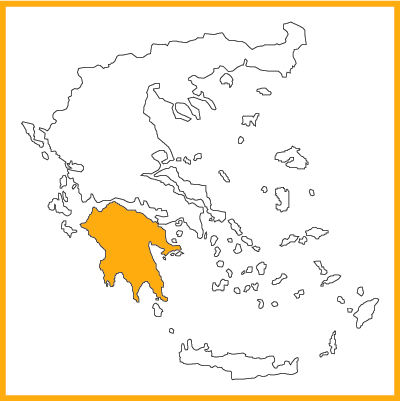Discover the Flavours of the Peloponnese
To travel through the Peloponnese is to step into the very heart of Greek mythology and culinary heritage. This sun-drenched peninsula—home of ancient Sparta, the Olympic Games, and King Agamemnon—is not just a destination of ruins and legends. It is a living, breathing region where Greek cuisine, tradition, and philoxenia (hospitality) come to life at every table.
Beyond its marble temples and mythic landscapes, the Peloponnese invites travellers to taste its soul through food and wine. Each dish tells a story of land, sea, and people—authentic, seasonal, and lovingly crafted.
The Holy Trinity of Peloponnesian Cuisine: Olive Oil, Wine & Mediterranean Bounty
Liquid Gold: The Olive Oil of the Peloponnese
The story of Peloponnesian gastronomy begins, as every Greek culinary story does, with olive oil — Greece’s legendary “liquid gold.” Nowhere does this ancient tradition shine more brightly than in the Peloponnese, the southern peninsula of mainland Greece, where olive trees carpet hillsides, valleys, and coastal plains. For millennia, families have tended their groves with devotion, producing extra virgin olive oils of exceptional purity and flavour. Each region contributes its own distinctive taste, shaped by the land, the sea, and the climate.
- Messenia: Located in the southwestern Peloponnese, Messenia is a land of rolling olive groves, golden beaches, and ancient cities, such as Kalamata — home to the world-famous olive variety of the same name. The region’s oils are fruity and balanced, with notes of fresh grass and artichoke, perfectly capturing the gentle character of the landscape.
- Laconia: Stretching across the southeast, Laconia is dominated by the imposing Taygetus Mountains and the historic city of Sparta. Its rugged terrain and dry winds produce bold, peppery oils with remarkable depth and antioxidant richness — flavours that mirror the strength and simplicity of Spartan tradition.
- Argolis: The Northeast Peloponnese unfolds across fertile plains, with the blue sea and ancient wonders like Nafplio, Mycenae, and Epidaurus. Here, olive groves thrive under the soft coastal light, yielding light, aromatic oils with delicate notes of almond and green tomato — ideal for seafood and summer salads.
- Arcadia: At the heart of the Peloponnese lies the mountainous region of Arcadia, long celebrated in Greek mythology as a land of rustic purity and natural harmony. From its high plateaus come rare, early-harvest oils — vivid, intense, and fragrant — treasured for their freshness and authenticity.
Together, these regions form the soul of Peloponnesian gastronomy. Their olive oils are more than ingredients — they are a living link to Greece’s history, its landscapes, and the timeless art of sharing food made with love and the light of the Mediterranean sun.
Visiting an olive oil mill during harvest season (October–January) offers a sensory experience, featuring freshly pressed oil, vibrant aromas, and the ancient ritual of the olive harvest.
👉 Explore our Peloponnese Olive Oil Experiences to taste award-winning oils straight from the source.
Vineyards of Myth: Peloponnesian Wines
The Peloponnese, a sun-drenched land where mountains meet the sea, is Greece’s largest and most diverse wine region — a mosaic of ancient vineyards and bold modern craftsmanship. Across its hills and valleys, winemakers draw on centuries of tradition and the peninsula’s varied terroirs to create wines of elegance, intensity, and unmistakable character. Several areas hold the coveted PDO (Protected Designation of Origin) status, ensuring authenticity and preserving the legacy of Greece’s great native varieties.
· Nemea (PDO Nemea – Agiorgitiko): In the gentle hills of northeastern Peloponnese, Nemea is the homeland of Agiorgitiko, one of Greece’s most celebrated red grapes. Its wines — known poetically as “the Blood of Hercules” — are deep, velvety, and full-bodied, balancing ripe red fruit with spice and soft tannins. The PDO Nemea appellation is the beating heart of Greek red wine culture.
👉 To taste these iconic reds right where they’re produced, join an authentic Nemea wine tasting.
· Mantinia (PDO Mantinia – Moschofilero): High on the Arcadian plateau, cool breezes and altitude give rise to Moschofilero, a pink-skinned grape producing crisp, aromatic whites alive with notes of rose petals, citrus, and fresh herbs. The PDO Mantinia wines embody the elegance of the mountains and the freshness of the Mediterranean.
· Patras & Achaia (PDO Patras, PDO Mavrodaphne of Patras, PDO Muscat of Patras): Along the northern coast, the region’s vineyards overlook the Gulf of Corinth. Here, diverse microclimates nurture both red and white varieties. Mavrodaphne, a local treasure, yields rich, sweet dessert wines layered with dried fruit and spice, while Roditis produces vibrant, citrus-driven whites under the PDO Patras designation. Muscat of Patras adds another note of distinction with its perfumed sweetness.
· Monemvasia & Laconia (PDO Monemvasia-Malvasia): In the southeastern Peloponnese, near the medieval fortress town of Monemvasia, vintners are reviving ancient grape varieties once prized across Europe. The PDO Monemvasia-Malvasia wines, inspired by the legendary sweet wines exported during the Byzantine era, are complex and amber-hued, combining tradition with a renewed artisanal spirit.
Together, these PDO regions form the soul of Peloponnesian winemaking — a living link between myth and modern mastery. Each glass tells a story of land and legend, sun and soil, capturing the timeless beauty of Greece in every drop.
For travellers seeking the region’s most historic vineyards, a wine tasting in Nemea offers a deep dive into the Peloponnese’s premier red wine terroir.
The Artisans of Flavour: Honey, Spirits & Cured Delicacies
Greek Honey from the Peloponnese
The region’s beekeepers produce some of Greece’s finest honeys, thanks to its wild thyme, fir forests, and heather-covered slopes.
- Thyme Honey (Mani): Aromatic, amber, and herbal.
- Fir Honey (Arcadia): Rare, mineral-rich, and less sweet.
- Heather Honey: Thick, tangy, and full-bodied.
Spirits of the Peloponnese
The Spirit of the Land: Peloponnesian Distillation Traditions
Distillation is a proud local tradition across the Peloponnese — a ritual born from the land’s agricultural bounty and the Greek spirit of hospitality. What began centuries ago as a way to use leftover grape pomace from winemaking has evolved into an art form, producing distinctive spirits and liqueurs that reflect both local craftsmanship and cultural identity.
- Tsipouro: A grape-based spirit distilled from the skins, seeds, and stems left after pressing the wine grapes. Depending on the region, tsipouro may be pure or flavoured with anise, giving it a subtle liquorice aroma reminiscent of ouzo. Traditionally made in small copper stills, it is often shared among friends and family, symbolising warmth, togetherness, and celebration. In mountain villages and seaside tavernas alike, tsipouro accompanies meze — small plates of olives, cheese, and cured fish — inviting long conversations and laughter.
- Tentoura (Patras): Originating in the port city of Patras, Tentoura is one of Greece’s oldest and most beloved herbal liqueurs. Its deep amber colour and aromatic blend of cinnamon, cloves, nutmeg, and citrus peel create a rich, spiced sweetness. Traditionally served as a digestif after meals or added to coffee for a warming twist, Tentoura has been a local favourite since the Venetian era, when spice trading flourished through the port. Today, it remains a symbol of Patras’ cosmopolitan heritage and its refined culinary tradition.
Together, tsipouro and tentoura embody the essence of Peloponnesian hospitality — bold yet refined, rooted in tradition yet endlessly inviting. Each sip tells a story of craftsmanship, celebration, and the enduring pleasure of sharing something made with care.
🥃 Experience the warmth of local hospitality on a Tsipouro and Tentoura Distillery Tour.
Traditional Deli Products
Preservation is an art form in the Peloponnese:
- Syglino (Mani) – Smoked pork with orange and spices.
- Louza – Air-dried pork loin, a Greek charcuterie classic.
- Spoon Sweets – Homemade fruit preserves, a symbol of hospitality.
- Pickled Caper Leaves & Kritamo – Bright, tangy touches to seafood or salads.
🫒 Discover authentic tastes in our Artisan Food Tours, where you’ll meet Dried Fruit, Pasta and Bakeries, Vinegar, producers, and taste local specialities.
Regional Highlights: Culinary Destinations of the Peloponnese
1. Messenia – Olive Groves and Sweet Traditions
- Kalamata Olives: World-renowned for their rich flavour.
- Lalagia: Fried dough ribbons drizzled with honey.
- Sykotaria: Figs stuffed with nuts and spices.
2. Laconia – The Spirit of Mani and Sparta
- Syglino and Maniotiki Pikantiki Salad.
- Laconian Olive Oil: Peppery, powerful, unforgettable.
- Regali Soup: A rustic dish of lamb, greens, and tradition.
3. Arcadia – Mountain Cuisine and Hearth Cooking
- Tsakonian Eggplant (PDO): Sweet and delicate.
- Hortopita and Triftopita: Savoury pies made with wild greens and cheese.
- Grilled Lamb & Goat: Seasoned with oregano and lemon.
The Soul of the Table: Dining Culture in the Peloponnese
Dining here is about connection, community, and joy.
- Tavernas serve seasonal dishes; owners often share homemade tsipouro on the house.
- Meze culture encourages sharing small plates—tzatziki, melitzanosalata, kolokythokeftedes—and lingering over conversation.
- Panigiria festivals transform village squares into open-air feasts with music, dancing, and endless grilled lamb.
🥘 Find your perfect Taverna or Culinary Experience in the Peloponnese.
Your Culinary Itinerary Through the Peloponnese
- Follow the Olive Oil Trail – Visit mills in Kalamata and Sparta.
- Embark on a Wine Odyssey – Taste reds in Nemea, whites in Mantinia, and dessert wines in Patras.
- Meet the Artisans – Visit bee farms, distilleries, and local markets.
- Master Local Dishes – Take a Greek cooking class in Nafplio, Kardamyli, or Mani.
🍷 Join our Wine Tasting Tours in the Peloponnese and meet the passionate winemakers redefining Greek viticulture — especially through curated Nemea wine tours that highlight the region’s legendary Agiorgitiko.
A Feast for the Senses and the Soul
The Peloponnese is more than a destination—it’s an edible journey through Greek heritage, where olive oil, wine, honey, and hospitality converge into an unforgettable experience. From its mountain villages to seaside tavernas, every flavour tells a story.
Savour the Peloponnese—a region where food is not just nourishment, but memory, love, and celebration.
Kali Orexi! (Bon Appétit!)




